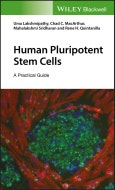Comprehensive coverage of the entire induced pluripotent stem cell basic work flow
Pluripotent stem cells (PSC) can divide indefinitely, self-renew, and can differentiate to functionally reconstitute almost any cell in the normal developmental pathway, given the right conditions. This comprehensive book, which was developed from a training course, covers all of the PSCs (embryonic, embryonic germ, and embryonic carcinoma) and their functions. It demonstrates the feeder-dependent and feeder-free culture of hESC and hiPSC, which will be referred to in all protocols as PSCs. It also addresses the methods commonly used to determine pluripotency, as defined by self-renewal marker expression and differentiation potential.
Human Pluripotent Stem Cells: A Practical Guide offers in-depth chapter coverage of introduction to stem cell, PSC culture, reprogramming, differentiation, PSC characterization, and more. It also includes four appendixes containing information on reagents, medias, and solutions; common antibodies; consumable and equipment; and logs and forms.
- Includes helpful tips and tricks that are normally omitted from regular research papers
- Features useful images to support the technical aspects and results visually as well as diagrammatic illustrations
- Presents specific sections (ie: reprogramming, differentiation) in a concise and easily digestible manner
- Written by experts with extensive experience in stem cell technologies
Human Pluripotent Stem Cells: A Practical Guide is an ideal text for stem cell researchers, including principal investigators, and others in university and industry settings, and for new graduate students in PSC labs.
Table of Contents
1 Introduction 1
1.1 Biosafety 1
1.2 Biosafety Levels 2
1.3 Aseptic Technique 2
1.4 Storage 6
1.5 Contamination 7
1.6 Pluripotent Stem Cells 8
1.7 Procedures 9
References 16
2 Pluripotent Stem Cell Culture 17
2.1 Introduction 17
2.2 Materials 18
2.3 Solutions 19
2.4 Methods 21
References 47
3 Reprogramming 49
3.1 Introduction 49
3.2 Materials 49
3.3 Solutions 54
3.4 Methods 57
References 97
4 Characterization 99
4.1 Introduction 99
4.2 Materials 101
4.3 Solutions 103
4.4 Methods 104
References 128
5 Differentiation 131
5.1 Introduction 131
5.2 Materials 131
5.3 Solutions 133
5.4 Methods 135
References 151
Index 153








